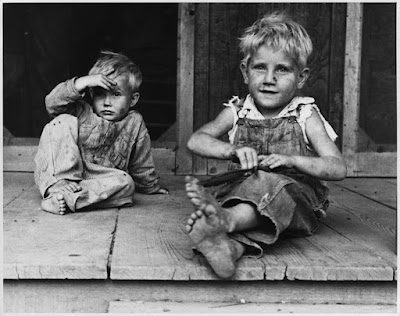A few days ago, Chris Martenson posted a blog essay titled "Will You Starve to Death This Year?" Martenson pointed out that escalating prices for natural gas have led to a global rise in fertilizer costs. The price of diesel, which runs the world's farm tractors, has also shot upward dramatically, contributing to a sharp increase in food prices. A ten percent decline in global food production, Martenson argued, would be catastrophic.
Other people are beginning to worry about food. On television, I'm now beginning to see ads from emergency-food-supply companies--the outfits that sell food packets that can be safely stored for up to 25 years. Is it time to stock up on canned goods?
I don't think Americans are in danger of starving to death--in the short term, at least. We live in a great country blessed with fertile soil, a temperate climate, and the advanced technology we need to feed a nation of 330 million people.
In addition, the U.S. has a pretty good safety net to make sure people don't go hungry. The federal government's SNAP program (food coupons) is readily available to low-income families. Thousands of churches and nonprofit agencies deliver food to people who need it--including elderly shut-ins.
The American consumer is paying more for food, and we can't always get the food we prefer due to kinks in the supply chain. But nobody will die of hunger in the U.S., at least not in the near-term future.
Nevertheless, Americans should not take our food for granted. I've been reading about famines, and history tells us that people can starve to death even in countries that export food.
Several million people starved to death during Ireland's Potato Famine of 1845-1849, even though the British government exported food out of Ireland. Almost four million Ukrainians died of hunger in 1932-1933 due to Stalin's order to seize food stocks from peasant farmers, even while the Soviets were exporting food to Europe.
Anne Applebaum, who wrote a masterful history of the Ukrainian famine, described how people react when they don't get enough to eat. First, hungry people respond with anger and violence--especially if they have access to firearms. Eventually, however, starving people fall into lethargic apathy and quietly die.
In The Great Hunger, the best treatment of the Irish potato famine, Cecil Woodham-Smith explained how mass starvation always leads to epidemics. Disease invariably follows when the living become too weak to bury the dead.
I am also convinced from my reading that mass starvation inevitably leads to cannabilism, even in advanced societies. The starving people of Leningrad began eating the dead during the Nazi's 900-day siege of the city, as did the Ukrainians during the Holodomor. During World War II, German prisoners of war descended into cannibalism when the Russians penned them up and allowed them to starve to death.
Americans have been blessed by abundant food for so long that we've forgotten its importance. We can eat whatever we want--from Russian caviar to Chicken McNuggets, and the grocery stores are always open.
Nevertheless, I think it is time for us to think about food. We still have plenty to eat, but the grocery-store shelves no longer have everything we desire. And food prices have gone up alarmingly over the last few months.
Martenson concluded his sobering essay by urging his readers to plant gardens. I agree. I have been gardening for about ten years, and I now grow both a spring and a fall garden.
My little vegetable garden can't sustain my family for any length of time, but I am learning how to tend my crops, how to spot and treat diseases, and when to fertilize and harvest.
Just as importantly, raising my own food is fulfilling on a spiritual level. Planting a seed and seeing it grow into a bean plant that twines around a trellis and produces something I can eat is a miracle. And nothing tastes better than a home-grown tomato picked from my own garden.
As Guy Clark observed in a famous song, "What would life be without homegrown tomatoes?" Indeed it would not be nearly so sweet.


